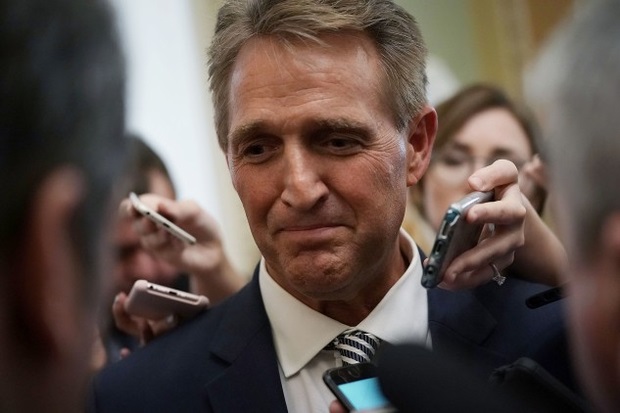Want to Find Out Whether a Lawmaker is Job Hunting? Good Luck
- Law meant to catch conflicts of interest a ‘failure,’ says watchdog
- House and Senate rules let most job searches be done in secret
Most lawmakers shopping around for high-paying jobs outside of Congress don’t publicly reveal who their next employers may be.
Heading into the 2018 election, 73 House members and eight senators either were serving their last weeks or already gone. A couple dozen more came on the job market after losing their elections. Only one, ex-Sen. Jeff Flake (R-Airz.), filed a public disclosure form.
Some already have landed:
- Akin Gump Strauss Hauer & Feld announced that newly ex-Reps. Ileana Ros-Lehtinen(R-FL) and Rep. Lamar Smith(R-TX) had joined the firm and intended to eventually register as lobbyists.
- Lynn Jenkins (R-Kan.) started her own firm, LJ Strategies
- Kevin Yoder (R-Kan.) is now a partner with HHQ Ventures, a lobbying firm run by former Rep. Ben Quayle.
- Dave Reichert (R-Wash.) is with Gordon Thomas Honeywell Government Affairs.
“The ethical and legal guidelines regarding negotiations for future employment were followed throughout the recruitment process,” Akin Gump spokesman Benjamin Harris said in an emailed statement.
Since 2014, no House members have filed paperwork to publicly disclose that they were negotiating for post-Congress employment.
They may not have had to because of the way the House and Senate ethics committees have interpreted requirements that took effect in 2008.
“We don’t have a clue of anybody who is negotiating future employment unless for some reason they decide they want to let us know,” said Craig Holman, a lobbyist at watchdog group Public Citizen, who called the disclosure requirements “a complete failure.’
“This is not what was intended,” he said in an interview.

In the House, job negotiations have to be disclosed publicly when there is a potential conflict of interest with official duties, and the lawmakers recuse themselves from working or taking action that issue.
The most recent disclosure form was filed in 2014 by then-Rep. James Moran (D-Va.), who reported talking with three organizations or companies, including law and lobbying firm McDermott Will & Emery, where he eventually ended up.
More common is a type of disclosure form that’s kept secret by the House Ethics Committee.
In the 115th Congress, the committee received 237 forms from members and top aides regarding outside employment negotiations, according to the panel’s annual report. That report doesn’t include a breakdown of the number members and staff. The committee also received 137 notices of conflict-of-interest recusals from senior staff over the same two-year period.
HEADHUNTER SHIELD
Caleb Burns, a partner at Wiley Rein who advises clients on ethics issues, says that the disclosures are designed to notify ethics officials about outside employment negotiations and decide if there are conflicts of interest can be “mitigated even further by retaining an executive search firm or headhunter to add a layer of insulation between the prospective employer and the House member.”
Senators have to file paperwork to publicly disclose their job searches once they’ve reached the stage where salary is addressed, And they’re not supposed to negotiate salaries and compensation for jobs involving lobbying work until their successor has been elected, according to the Senate Ethics Committee.
Of the senators who left at the end of the 115th Congress, only Flake filed a disclosure form. He reported that he had spoken with CBS News and speakers agency Harry Walker Agency,
Flake’s form was the first public disclosure filed with the Senate since 2016 and only the ninth ever submitted. Only nine now-former House members also have opted to file publicly.
TAUZIN’S $2 MILLION
The disclosure requirements are part of the 2007 Honest Leadership and Open Government Act (Public Law 110-81).
A few years earlier, the Pharmaceutical Research and Manufacturers of America approached then-Energy and Commerce Chairman Billy Tauzin (R-La.) about becoming its president. Tauzin was one of the main negotiators of the 2003 Medicare Modernization Act (Public Law 108-173), which included prescription drug coverage — a big deal to PhRMA’s members.
Tauzin didn’t jump at the job right away but did drop his chairmanship. And after finishing his term he became the group’s president, with a $2 million salary.
When former House members depart, they have a one-year “cooling off” period that prohibits them from advocating before their former colleagues.
Ex-senators have to wait two years before reaching out to both House and Senate members on behalf of a client. Former lawmakers from both chambers aren’t restricted in contacts with the executive branch.
That means Jon Kyl (R-Ariz.) is restricted now that he has gone back to his job as a Covington & Burling lobbyist after temporarily filling the open seat of the late Sen. John McCain.
In his financial disclosure filed to the Senate, he reported earning almost $1.9 million from the firm from January 2017 to September 2018. That disclosure form became publicly available after he left Capitol Hill because Kyl received a 90-day filing extension.
Kyl’s clients included SAP America, Qualcomm, PhRMA and Northrop Grumman, according to lobbying disclosures.
Pat Tiberi (R-Ohio) was criticized for quitting Congress to head the Ohio Business Roundtable not long after he helped write legislation to slash corporate tax rates (Public Law 115-97).
Spokeswoman Olivia Hnat said Tiberi had been an advocate for a “simpler, flatter, and fairer tax code” since he entered Congress in 2001.
To contact the reporter on this story: Megan R. Wilson in Washington at mwilson@bgov.com
To contact the editors responsible for this story: Katherine Rizzo at krizzo@bgov.com; Heather Rothman at hrothman@bgov.com